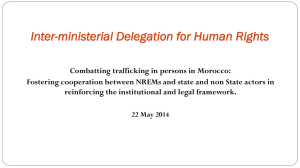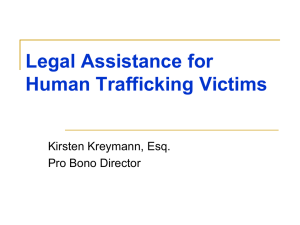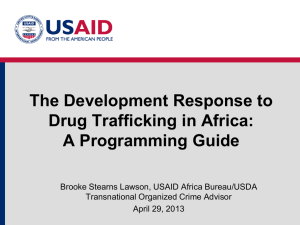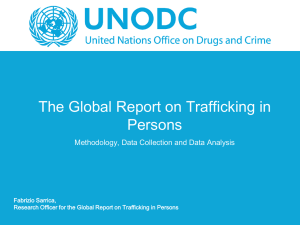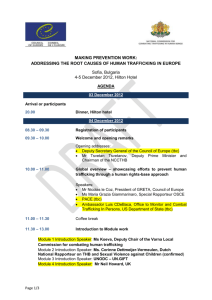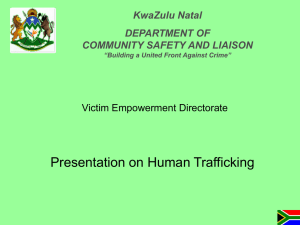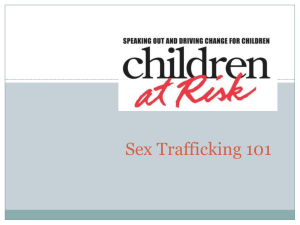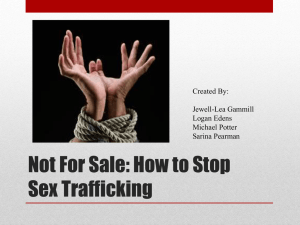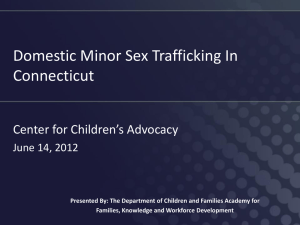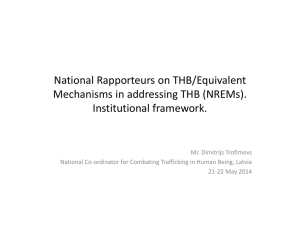Mr. R. Hamid Patilima, Consultant for Government in Trafficking
advertisement
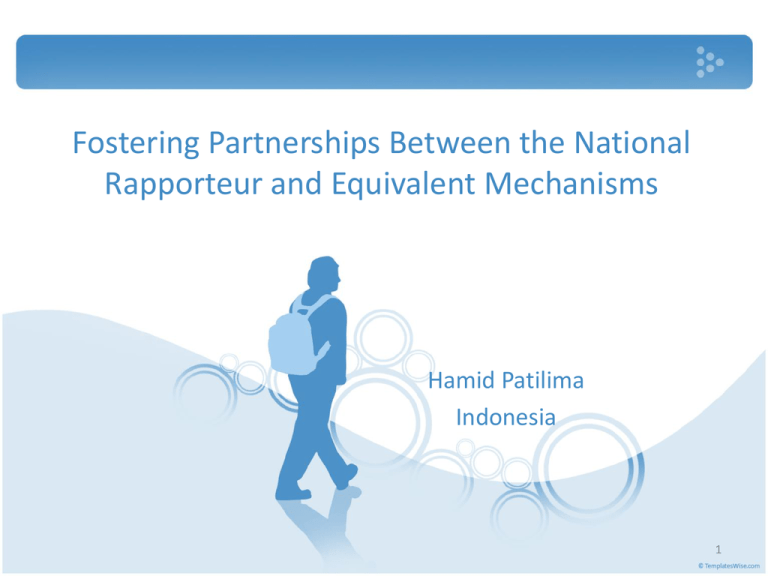
Fostering Partnerships Between the National Rapporteur and Equivalent Mechanisms Hamid Patilima Indonesia 1 Background • The National Rapporteur main task is to report the development of eradication of trafficking in persons; • The National Rapporteur in collaboration with the Secretariat of the National Task Force to make reports to prevention and handling of trafficking in persons; • The National Rapporteur in collaboration with the Secretariat of Task Force to collect informations and data from each sub-task force (central, provincial, and regency/city) with reference to guide the monitoring, evaluation, and reporting eradication of trafficking in persons; • Reports submitted by the Secretariat of the Task Force to the President through the Presidential Working Unit for Monitoring Development and Development Control. 2 Situation in Indonesia •The Act No. 21 of 2007 •The Act No. 5 of 2009 •The Act No. 14 of 2009 •The Act No. 10 of 2012 •GR No. 9 of 2008 •PR No. 69 of 2008 Legal Framework Institutional •National Task Force & in 30 provinces & 151 districts/cities •National/Provincil a/District/City Action Plan •MSS and SOP •ISCWC 28 prov&246 d/c •SPH 26 location •WCSU 34 prov/422 Resort •29 Citizen Service •Protection Agency Witness/Victim Services Increased Capacity •Institutional strenghtening •The capacity of law enforcement •MoU between the province as a source, transit, destination •Providing online services Coordination 3 Challenge (1) • High turnover of officials and staff in government agencies, service agencies, and law enforcement agencies, both central and local levels; • Socialization policies eradication of trafficking in persons are not evenly distributed; • Implementation of policies eradication of trafficking both at national and local levels is not optimal yet, especially on the implementation of Minimum Service Standards and Standard Operating Procedures handling of witnesses/victims of trafficking in persons; 4 Challenge (2) • Use of instrument data that has been developed by the government is not maximized yet, so each agency uses the different instruments; • Service provider of trafficking victims institutions (shelters, safe houses) are not all having systematic reports, data updates and related information about provided services for the victims or accepted by the victims; • Not all of Non-government Institute has sent the report of the handling of trafficking victims to local and national task force, and not all of the regional task force has regularly send reports to the central task force; 5 Challenge (3) • Coordination between sub-task force in the task force has not been running regularly; and coordination between regional task force with a national task force is not maximized yet. Because not all of the government agencies has allocated a special budget for meeting coordination and preparation of reports; • Professional assistants of human trafficking victims are still limited, consequently there are several victims which do not get accesses for the services and the victims are not dare to report the cases; 6 Challenge (4) • Paralegal labor in eradication of trafficking in persons is still limited; • Efforts to strengthen the victim is not maximalized yet, in order to testify at the level of investigation and at the trial level; • Government has not maximally facilitated nongovernmental organizations in efforts to address trafficking in persons; 7 Recommendation (1) • Task Force Secretariat on National Rapporteur mandates with the primary task, status, and effective working and measurable methods; • Encouraging National Rapporteur to: – have the capacity to provide an overview of national efforts and eradication of trafficking in persons to the policy makers and practitioners; – become an instrument for policy towards a more effective and increased awareness; – have the potential to assist in developing a balanced information system (use of the same indicators); – become the instrument with the potential to strengthen the regional cooperation; – have the capacity to provide evidence-based information for policy makers and practitioners. 8 Recommendation (2) • Increasing public awareness of the impact of human trafficking through socialization, Public Campaign and IEC; • Strengthening institutional Task Force of Crime Prevention and Handling Trafficking in Persons at the central, provincial, and regency/city; • Improvement of human resources management and institutional support prevention of trafficking in persons, through advocacy and training across ministries/agencies, cross- regional work units, and NGOs; • Improved fulfillment of the rights of witnesses and/or victims of trafficking in persons, through which service quality and performance Minimum Service Standards; 9 Recommendation (3) • Improved service staff in favor of a witness and/or victim service units including officer complaint, medical rehabilitation, social rehabilitation, repatriation, and reintegration; • Improving Law Enforcement Officials capacity through workshops, training, and exchange programs; • Improved Data Availability Crime of Trafficking in Persons and comprehensive disaggregated, conducted through the collection, processing, analysis, and reporting of data; 10 Recommendation (4) • Monitoring and evaluation of policy implementation eradication of trafficking in persons in order to realize the fulfillment of the rights of witnesses and/or victims of gender perspective and human rights; • Increasing community participation both nongovernmental organizations, the media, and the business community in the prevention and handling of trafficking in persons. 11 Thank You ขอบคุณ Dr. Hamid Patilima, Consultant for Government in Trafficking Issues and Child Protection, Anti-trafficking task force team coordinated by the Ministry for Women's Empowerment and Children's Protection, Indonesia 12

